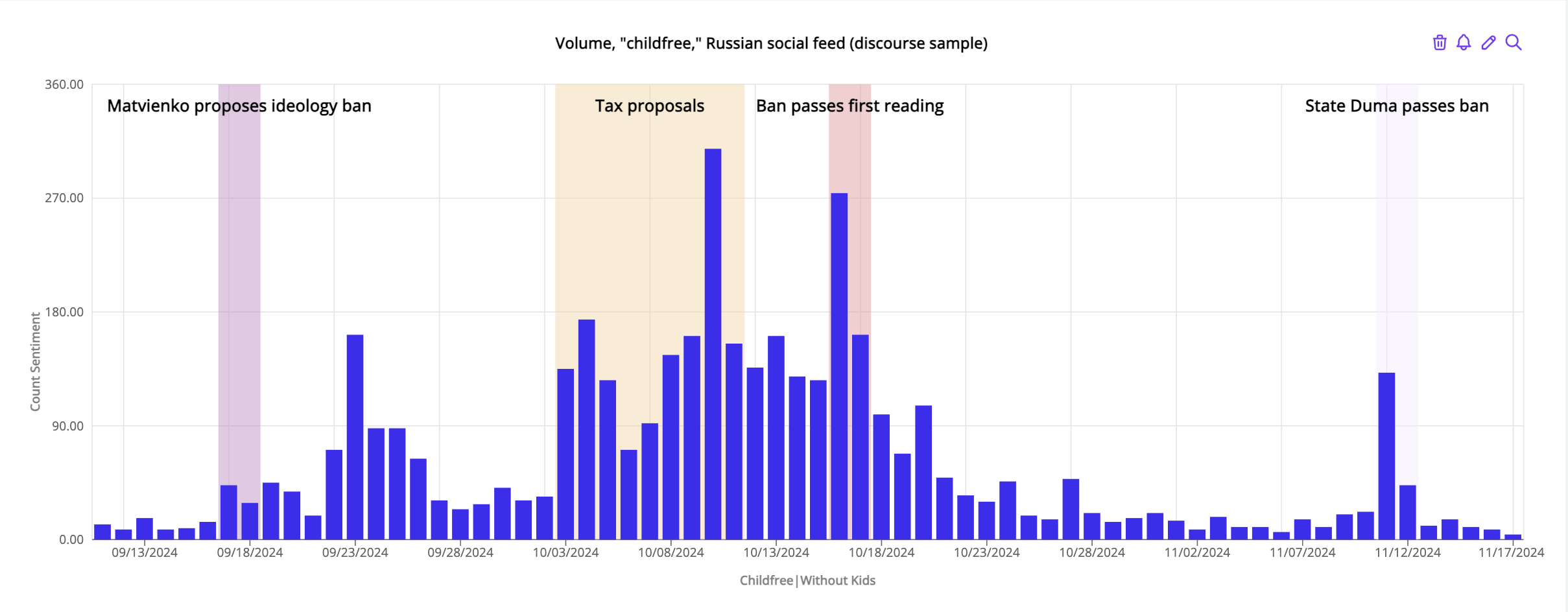What are Russians saying about the "Child-Free Propaganda" ban?
Key takeaways:
- The Russian parliament has passed a law banning “child-free propaganda”—that is, promoting the benefits of a child-free lifestyle or the refusal to have children.
- The Russian birth rate has fallen to a 25-year low.
- On social media, many Russians are complaining that the law does nothing to address the real causes of low birth rates: economic hardship and political uncertainty.
As FilterLabs reported last June, the Russian government is seriously concerned by the country’s declining birth rate. And the problem is not going away. In September Russia’s birth rate fell to its lowest in 25 years, a situation a Kremlin spokesman called “catastrophic for the future of our nation.”
In an effort to reverse the decline, the State Duma, the lower house of Russia’s parliament, last week passed a law that outlaws “child-free propaganda.” A few hours ago, the Federation Council, the upper house of the parliament, unanimously approved the bill as well.
Using Talisman, our data dashboard, FilterLabs has been following this story. By gathering and analyzing millions of posts on social media, discussion forums, and messaging apps, we can see what ordinary Russians are saying about the law—and what effect it might have.The topic of “child-free propaganda” and other anti-childlessness measures has been popping up on Russian social media periodically this fall:

The spikes have generally been in reaction to actions or proposals by Russian officials are taking, or discussing, in an effort to raise the birth rate. Valentina Matviyenko, the chairwoman of the Federation Council, first proposed the ban on “child-free ideology” in mid-September (NB: shortly after the “catastrophic” births report), but the issue didn’t receive too much attention until October. Then, Russian State Duma proposed taxing childless couples, and a week later Andrey Zubets, a state economist, suggested staggeringly high figures for the tax. A week of animated (and largely negative) online discussion ensued; by October 16 there were even reports that Zubets was receiving threats.
The next day, the bill was approved on its first reading in the State Duma, the first step towards final approval. But fervor around the topic then died down until last week, when the law passed the State Duma, kicking off another round of discourse on Russian social media.
Sentiment in the discourse around the ban has been negative and unstable:
The sentiment drop starting on September 17 corresponds to Matviyenko's comments, with much of the conversation focused on the economic realities affecting people’s thoughts about having children. On the social media platform VK, one commenter sarcastically wrote, “Now is a great time to start a family and have children when everyone is confident about the future.” Another fumed, “Instead of creating conditions for a normal standard of living, they decided to make things worse again.”
Another commenter dismissed the idea that feminism was to blame for the low birth rate: “What does feminism have to do with it, half of Russia's fathers are childfree…” (Ouch.)
Average sentiment scores spiked with the law’s introduction to the Duma in September, but the underlying comments remained critical. Many social media users said that no such “child-free” ideology exists in Russia; government officials were just making things up or creating problems that they could look like they were solving. The real problem, one post pointed out, was that “soon there will be no fathers in Russia,” referring to the war in Ukraine.
There were similarly strong reactions to the proposals regarding a childlessness tax. One commenter, responding to a news story on Zubets being threatened, retorted, “And what did you want when introducing this tax? The people in Russia are not Moscow, you would have been better off introducing a tax to improve the lives of young Russians, so that they would not get into bondage with a mortgage.”
All the same criticism appeared again last week, after the law’s passage in the State Duma.
In sum, there appears to be almost no popular support for the legislation. People are extremely upset with the law, saying it’s absolutely ridiculous to expect people to give birth while the country is in a complete disarray.
Considering the “propaganda” ban and the Russian people’s responses, we find ourselves wondering: why would anyone need to make child-free propaganda in Russia in the first place? The war and the economy are making a compelling case for being child-free already.
Explore the Data in Talisman
Check out the live data on our data analysis platform, Talisman! You can explore the charts in the interactive dashboard for this newsletter, and subscribers with full platform access can even investigate the individual artifacts underlying the data. This is an unfolding story, so stay tuned to the dashboard’s graphs to see how sentiment shifts in response to today’s Federation Council vote.
If you don't have a Talisman account, sign up now—a basic subscription is free!
%20-%20Tradmark.png)

